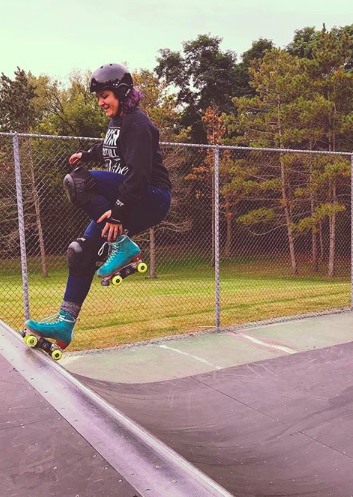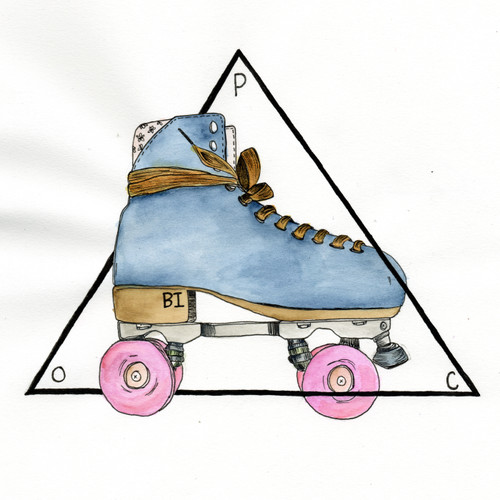The origin Story of BIPOCWhoSkate, as told by Neon, the founder
Posted by Neon on Oct 10th 2019
I would like to preface this blog post by saying thank you to Smarty & Strong Athletic, not just for inviting me into this space to share the story behind BIPOCWhoSkate, but for inspiring and supporting diverse athletes in the roller skating community.
Hi, I’m Neon, and I started BIPOCWhoSkate in January of 2019. I skated with Madison Roller Derby from 2014-2018, with the Dairyland Dolls from 2016-2018, and with Team IRN at the 2018 World Cup.
In addition to skating derby, I’ve been skating at skate parks off and on since 2014. Like many people, I quickly fell in love with the community, along with the main brands that were setting the skate park scene.
In 2018 my derby career came to a halt when I was dished a career-ending shoulder to the jaw during the first place game at the Clover Cup. This hit to the face resulted in a severe concussion with zero symptom-free days for 5 months. With derby off of the table, my PT encouraged me to get back into park skating as a form of therapy for my brain and my soul. It was really helpful for my recovery, as well as retaining my identity as a roller skater.
When I retired from derby and park skating became my main focus, I started to become frustrated with the lack of diversity on the big park skating teams. It was hard not to notice that even if the team was diverse, they were only displaying their best white skaters. I started BIPOCWhoSkate as a way to channel this frustration into a movement for positive change. I was, and still am, heavily inspired by my friend Olive and their work with Queer Skate Alliance. The conversation and growth within that community has been beautiful to witness. I hope to parallel that work within the BIPOC skate community and at the intersection of our two communities as well.
Right now, at this current moment, I’m angry and sad about the lack of representation we’ve seen on social media, as well as the types of skaters on sponsored park teams. When your team and/or marketing lacks diversity of all kinds, it shows people in those left-out communities that they don’t have a place in roller skating, further excluding and isolating already marginalized folx.
Roller skating is an activity that has roots in POC communities. Many rinks are in POC communities. Many derby practices are at these rinks, in these spaces. These are just a few reasons that we HAVE to show BIPOC skaters that they do have a place in roller skating.
As these larger skate businesses slowly begin to "do better" it’s a bittersweet feeling because I’ll never know if their motive was genuine or if it was genuinely good for business to tokenize BIPOC skaters. It’s a good reminder to all of us that Impact > Intention on two levels. On the one hand, you can have the best of intentions and still create a very negative experience for someone, and on the other, your intention/motivation can be selfish but your impact can be a good one.
BIPOCWhoSkate is not just about reminding the skating community at large that Black folx, Indigenous folx, and People of Color skate. It’s about challenging capitalist/consumerist practices and branding/brand loyalty that run deep within the roller skating community; which ultimately contributes to continued marginalization of certain communities. Additionally, many large corporations are latching on to the roller skating fad and just want to access our spending dollars. They do not contribute to the health of our community or do any good in our community with that money, and often these products are made by oppressed, low paid workers.
Although my focus has predominantly been on creating change in the park skating community and skate businesses, there are many issues within the Women's Flat Track Derby Association (WFTDA) that must also be addressed so that positive change may happen. Issues that we have seen include refs more harshly penalizing BIPOC skaters and refs calling skaters by their skin color instead of their jersey color. Both of these examples should never be tolerated. Frankly, I was disappointed by the WFTDA’s response when both of these examples happened yet again this past summer.
To be totally honest, this is an arena where I have struggled to help enact change because of my personal journey in roller derby that I am still working through. Regardless, I want to help change the WFTDA and make it a safer space. I am committed to assisting others who are working towards a similar goal and I recently joined a WFTDA accountability committee.
My ultimate goal in creating BIPOCWhoSkate is to create a space not just for skaters who identify as Black, Indigenous, and/or a Person of Color, but for BIPOC skaters of varying skill level. Often times, we only see these super "shiny" skaters and it can be difficult to relate to or intimidating for a new skater. I want people to know that they add just as much value to this community as high-level sponsored derby and park skaters. It's important to me that they have the opportunity to be seen, heard, and loved.
I've used the BIPOCWhoSkate page to bring up important topics and start conversations, and I hope to contribute to a movement of diversity, equity, and inclusion (of all kinds, not just race) in our community that many others are also working towards. Team Indigenous & Jewish Roller Derby - I’m so excited and proud to see my friends skating in the We Are Nation game. Also Derby Without Borders, Black Roller Derby Network, and Mick Swagger are a few other groups/individuals who do important work and inspire me to work harder. I’m so excited to see new projects and events pop up as other people find ways to create space for BIPOC skaters.
Below is an image of Neon ramp skating. The watercolor of the BIPOCWhoSkate logo was created by Carley Doty



